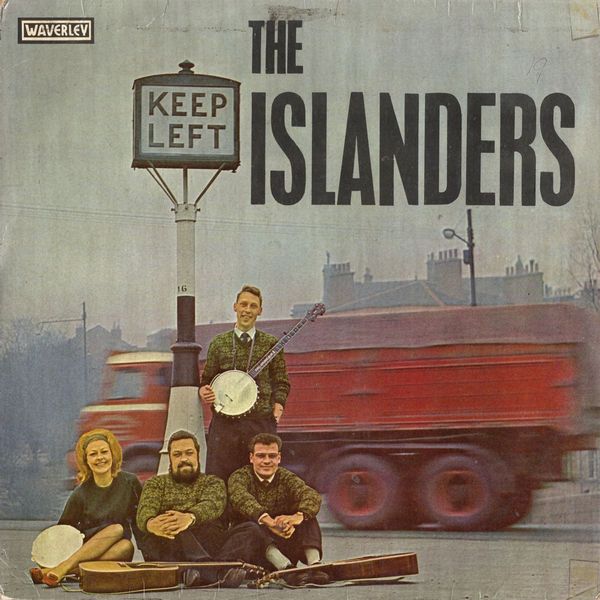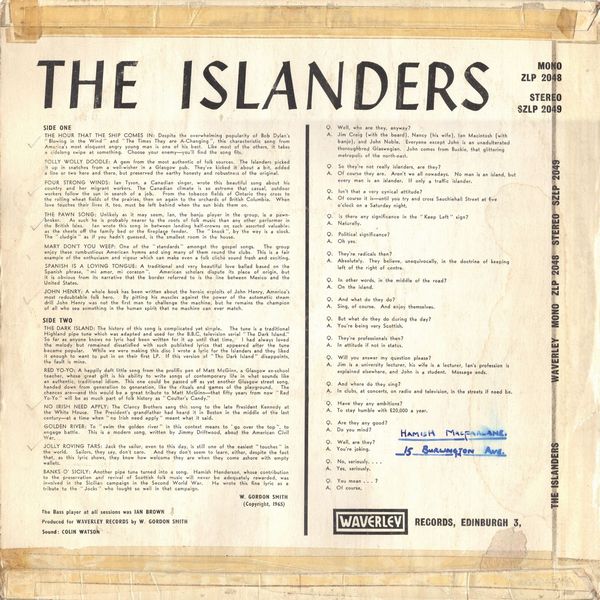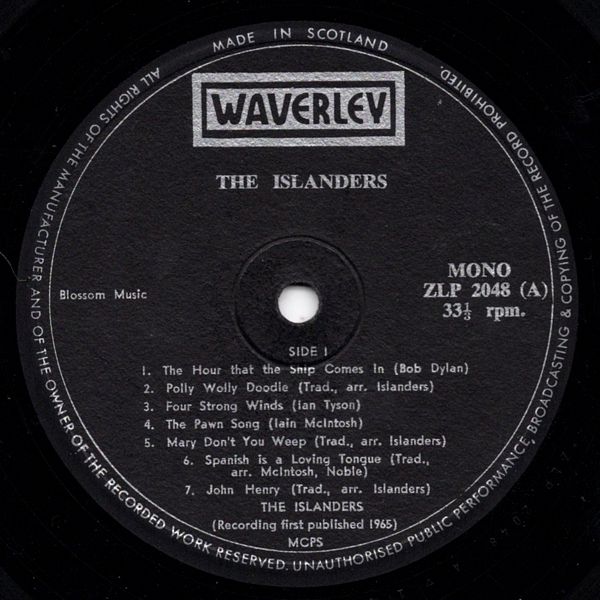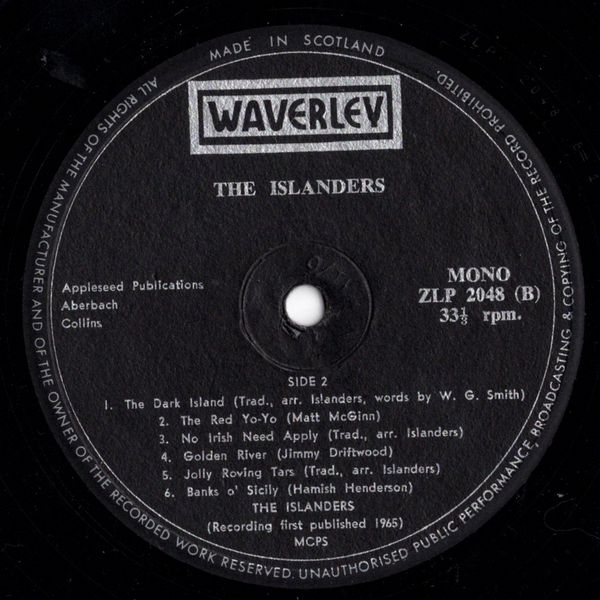
 |


 |
Sleeve Notes
THE HOUR THAT THE SHIP COMES IN:
Despite the overwhelming popularity of Bob Dylan's "Blowing in the Wind" and "The Times They are A-Changing", this characteristic song from America's most eloquent angry young man is one of his best. Like most of the others, it takes a sidelong swipe at something. Choose your enemy-you'll find the song fits.
POLLY WOLLY DOODLE:
A gem from the most authentic of folk sources. The Islanders picked it up in snatches from a well-wisher in a Glasgow pub. They've kicked it about a bit. added a line or two here and there, but preserved the earthy honesty and robustness of the original.
FOUR STRONG WINDS:
Ian Tyson, a Canadian singer, wrote this beautiful song about his country and her migrant workers. The Canadian climate is so extreme that casual, outdoor workers follow the sun in search of a job. From the tobacco fields of Ontario they cross to the rolling wheat fields of the prairies, then on again to the orchards of British Columbia. love touches their lives it, too, must be left behind when the sun bids them on.
THE PAWN SONG:
Unlikely as it may seem. Ian, the banjo player in the group, is a pawn-broker. As such he is probably nearer to the roots of folk music than any other performer in the British Isles. Ian wrote this song in between lending half-crowns on such assorted valuable; as the sheets off the family bed or the fireplace fender. The "knock", by the way is a clock. The "cludgie" as if you hadn't guessed, is the smallest room in the house.
MARY DON'T YOU WEEP:
One of the "standards" amongst the gospel songs. The group enjoy these rumbustious American hymns and sing many of them round the clubs. This a fair example of the enthusiasm and vigour which can make even a folk cliche sound fresh and exciting.
SPANISH IS A LOVING TONGUE:
A traditional and very beautiful love ballad based on the Spanish phrase, "mi amor, mi corazon". American scholars dispute its place of origin, but it is obvious from its narrative that the border referred to is the line between Mexico and United States.
JOHN HENRY:
A whole book has been written about the heroic exploits of John Henry, America's most redoubtable folk hero. By pitting his muscles against the power of the automatic steam drill John Henry was not the first man to challenge the machine, but he remains the champion of all who see something in the human spirit that no machine can ever match.
THE DARK ISLAND:
The history of this song is complicated yet simple. The tune is a traditional Highland pipe tune which was adapted and used for the B.B.C. television serial "The Dark Island." So far as anyone knows no lyric had been written for it up until that time. I had always loved the melody but remained dissatisfied with such published lyrics that appeared after the tune became popular. While we were making this disc I wrote a lyric for the Islanders and they liked it enough to want to put in on their first LP. If this version of "The Dark Island" disappoints, the fault is mine.
RED YO-YO:
A happily daft little song from the prolific pen of Matt McGinn, a Glasgow ex-school teacher, whose great gift is his ability to write songs of contemporary life in what sounds like an authentic, Traditional idiom. This one could be passed off as yet another Glasgow street song. handed down from generation to generation, like the rituals and games of the plavground. The chances are-and this would be a great tribute to Matt McGinn — that fifty years from now ' Red Yo-Yo " will be as much part of folk history as "Coulter's Candy."
NO IRISH NEED APPLY:
The Clancy Brothers sang this song to the late President Kennedy at the White House. The President's grandfather had heard it in Boston in the middle of the last century-at a time when " no Irish need apply" meant what it said.
GOLDEN RIVER:
To " swim the golden river" in this context means to ' go over the top", to engage battle. This a modern song, written by Jimmy Driftwood, about the American Civil War.
JOLLY ROVING TARS:
Jack the sailor, even to this day, is still one of the easiest "touches" in the world. Sailors, they say, don't care. And they don't seem to learn, either, despite the fact that, as this lyric shows, they know how welcome they are when they come ashore with empty wallets.
BANKS O' SICILY:
Another pipe tune turned into a song. Hamish Henderson, whose contribution to the preservation and revival of Scottish folk music will never be adequately
rewardeo involved in the Sicilian campaign in the Second World War. He wrote this fine lyric as a tribute to the "Jocks " who fought so well in that campaign.
W. GORDON SMITH
(Copyright, 1965)
Q. Well, who are they, anyway?
A. Jim Craig (with the beard), Nancy (his wife), Ian [ sic] Macintosh (with banjo), and John Noble. Everyone except John is an unadulterated Glaswegian. John comes from Buckie that glittering metropolis of the north-east.
Q. So they're not really islanders, are they?
A. Of course they are. Aren't we all nowadays. No man is an island, but every man is an islander. If only a traffic islander.
Q. Isn't that a very cynical attitude?
A. Of course it is-until you try and cross Sauchiehall Street at five o'clock on a Saturday night.
Q. is there any significance in the "Keep Left" sign?
A. Naturally.
Q. Political significance?
A. Oh yes.
Q. They're radicals then?
A. Absolutely. They believe, unequivocally, in the doctrine of keeping left of the right of centre.
Q. In other words, in the middle of the road?
A. On the island.
Q. And what do they do?
A. Sing, of course. And enjoy themselves.
Q. But what do they do during the day?
A. You're being very Scottish.
Q. They're professionals then?
A. In attitude if not in status.
Q. Will you answer my question please?
A. Jim is a university lecturer, his wife is a lecturer, Ian's [ sic] profession is explained elsewhere, and John is a student. Message ends.
Q. And where do they sing?
A. In clubs, at concerts, on radio and television, in the streets if need be.
Q. Have they any ambitions?
A. To stay humble with 20,000 a year.
Q. Are they any good?
A. Do you mind?
Q. Well, are they?
A. You're joking.
Q. No, seriously…
A. Yes, seriously.